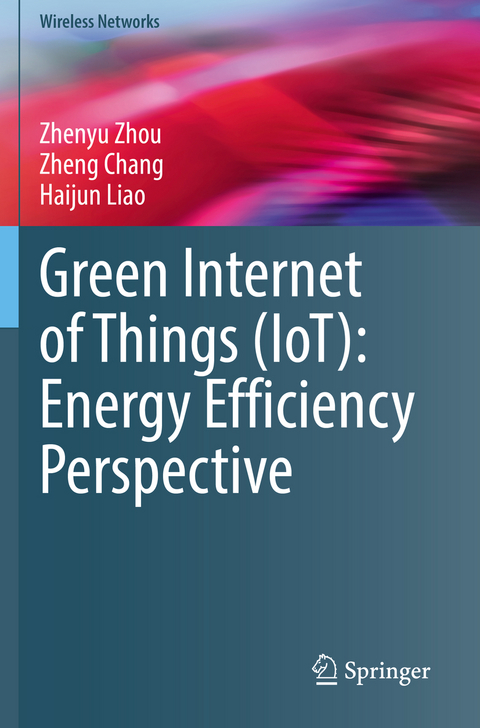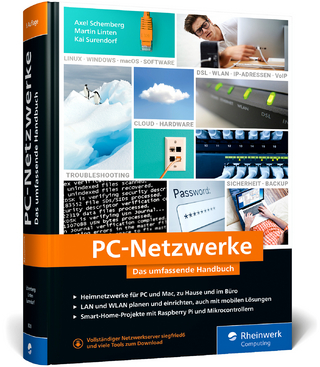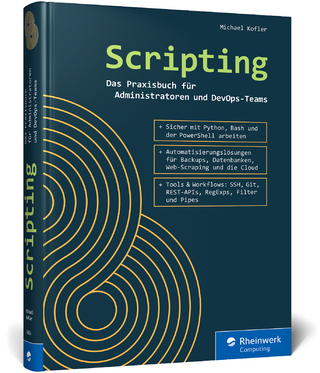
Green Internet of Things (IoT): Energy Efficiency Perspective
Springer International Publishing (Verlag)
978-3-030-64056-9 (ISBN)
Energy efficiency issues for green internet of things (IoT) are investigated in this book, from the perspectives of device-to-device (D2D) communications, machine-to-machine (M2M) communications, and air-ground networks. Specifically, critical green IoT techniques from D2D communications in the cellular network to M2M communications in industrial IoT (IIoT), (from single physical-layer optimization to cross-layer optimization, and from single-layer ground networks to stereoscopic air-ground networks) are discussed in both theoretical problem formulation and simulation result analysis in this book.
Internet of Things (IoT) offers a platform that enables sensors and devices to connect seamlessly in an intelligent environment, thus providing intelligence services including monitoring systems, industrial automation, and ultimately smart cities. However, the huge potentials of IoT are constrained by high energy consumption, limited battery capacity, and the slow progress of battery technology. The high energy consumption of IoT device causes communication interruption, information loss, and short network lifetime. Moreover, once deployed, the batteries inside IoT devices cannot be replaced in time. Therefore, energy efficient resource allocation is urgent to be investigated to improve the energy efficiency of IoT, facilitate green IoT, and extend the network lifetime.
lt;b>Zhenyu Zhou received his M.E. and Ph.D degree from Waseda University, Tokyo, Japan in 2008 and 2011 respectively. From April 2012 to March 2013, he was the chief researcher at Department of Technology, KDDI, Tokyo, Japan. From September 2012 to April 2019, he was an Associate Professor at School of Electrical and Electronic Engineering, North China Electric Power University, China. Since April 2019, he has been a full professor at the same university. He served as an Associate Editor for IEEE Internet of Things Journal, IEEE Access, EURASIP Journal on Wireless Communications and Networking and a Guest Editor for IEEE Communications Magazine, IEEE Transactions on Industrial Informatics, and Transactions on Emerging Telecommunications Technologies. He served as the Tutorial Chair for the 2020 IEEE 91st Vehicular Technology Conference (VTC), Workshop Co-Chair for the 2020 IEEE/CIC International Conference on Communications in China (ICCC 2020), Workshop Co-Chair for IEEE Globecom 2018 International Workshop on Ultra-high Speed, Low Latency and Massive Connectivity Communications for 5G/B5G, and IEEE ISADS 2015 International Workshop on Smart Grid Communications and Networking. He also served as the TPC Member for numerous international conferences such as IEEE Globecom, IEEE ICC, IEEE CCNC, IEEE APCC, IEEE VTC, IEEE PIMRC, etc. He is a voting member of IEEE Standard Association P1932.1 Working Group. He was the recipient of the Ministry of Education of the People's Republic of China Science and Technology Second Prize, the IEEE Communications Society Asia-Pacific Board Outstanding Young Researcher 2019, 2018 Industry-University-Research Institute Collaboration Innovation Award of China, the "Beijing Outstanding Young Talent" Award in 2016, the IET Premium Award in 2017, the IEEE ComSoc Green Communications and Computing Technical Committee 2017 Best Paper Award, the IEEE Globecom 2018 Best Paper Award, the IEEE ComSoc Green Communications and Computing Technical Committee 2018 Best Paper Award, IEEE ComSoc Communications Systems Integration and Modeling (CSIM) Technical Committee 2019 Best Paper Award, and IEEE International Wireless Communications and Mobile Computing Conference (IWCMC) 2019 Best Paper Award, IEEE Vehicular Technology Society "Young Researcher Encouragement Award" in 2009. His research interests include green communications, vehicular communications, and smart grid communications.
Zheng Chang received the B.Eng. degree from Jilin University, Changchun, China in 2007, M.Sc. (Tech.) degree from Helsinki University of Technology (Now Aalto University), Espoo, Finland in 2009 and Ph.D degree from the University of Jyväskylä, Jyväskylä, Finland in 2013. Since 2008, he has held various research positions at Helsinki University of Technology, University of Jyväskylä and Magister Solutions Ltd in Finland. During June to August in 2013, he was a visiting researcher at Tsinghua University, China, and during April to May in 2015, he was a visiting researcher at University of Houston, TX. He has been awarded by the Ulla Tuominen Foundation, the Nokia Foundation, and the Riitta and Jorma J. Takanen Foundation for his research excellence. He has been awarded as 2018 IEEE Communications Society Best Young Researcher for Europe, Middle East, and Africa Region. He has received Best Conference Paper awards from IEEE Technical Committee on Green Communications & Computing (TCGCC) and 23rd Asia-Pacific Conference on Communications (APCC) in 2017. He serves as editor of IEEE Access, Springer Wireless Networks and International Journal of Distributed Sensor Networks, and guest editor for IEEE Wireless Communications, IEEE Communications Magazine, IEEE Network, IEEE Internet of Things Journal, EURASIP Journal on Wireless Communications and Networking, Physical Communications, and Wireless Communications and Mobile Computing. He also served as TPC member for many IEEE major conferen
Preface- 1.- Introduction.- 2 Energy-Efficient Resource Allocationin for D2D Enabled Cellular Networks.- 3 Energy Harvesting Enabled Energy Efficient Cognitive Machine-to-Machine Communications.- 4 Software Defined Machine-to-Machine Communication for Smart Energy Management in Power Grids.- 5 Energy-Efficient M2M Communicationsin for Industrial Automation.- 6 Energy-Efficient Context-Aware Resource Allocation for Edge-Computing-Empowered Industrial IoT.- 7 Licensed and Unlicensed Spectrum Management for EnergyEfficient Cognitive M2M.- 8 Energy-Efficient Task Assignment and Route Planning for UAV.- 9 Energy-Efficient and Secure Resource Allocation for MultipleAntenna NOMA with Wireless Power Transfer.
| Erscheinungsdatum | 18.02.2022 |
|---|---|
| Reihe/Serie | Wireless Networks |
| Zusatzinfo | XII, 185 p. 60 illus., 51 illus. in color. |
| Verlagsort | Cham |
| Sprache | englisch |
| Maße | 155 x 235 mm |
| Gewicht | 314 g |
| Themenwelt | Mathematik / Informatik ► Informatik ► Netzwerke |
| Technik ► Nachrichtentechnik | |
| Schlagworte | Context Awareness • Device-to-device communications • edge computing • energy efficiency • Energy harvesting • Fog Computing • Green communications • Internet of Things (IoT) • Internet of unmanned aerial vehicles • internet of vehicles • Machine-to-Machine Communications • Massive MIMO • Mobile Edge Computing • multiple-antenna NOMA • Network Function Virtualization • Resource Allocation • software-defined networking • Wireless Power Transfer |
| ISBN-10 | 3-030-64056-6 / 3030640566 |
| ISBN-13 | 978-3-030-64056-9 / 9783030640569 |
| Zustand | Neuware |
| Haben Sie eine Frage zum Produkt? |
aus dem Bereich


